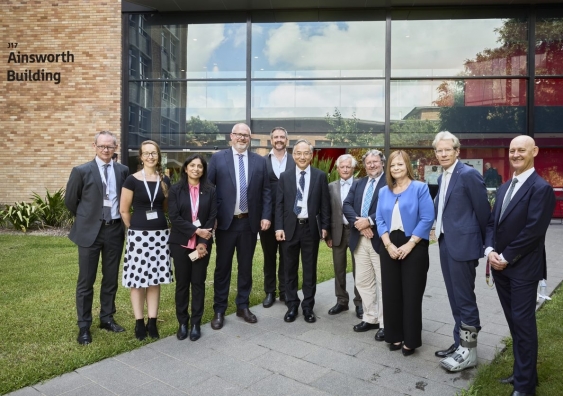ARC Research Hub for Connected Sensors for Health opens at UNSW
The Research Hub aims to position Australia at the forefront of connected health by integrating sensor science with data analytics, regulatory approval, and manufacturing capabilities.
The Research Hub aims to position Australia at the forefront of connected health by integrating sensor science with data analytics, regulatory approval, and manufacturing capabilities.

The Australian Research Council (ARC) Research Hub for Connected Sensors for Health focused on wearable medical devices, one of the most exciting fields of innovation in Australia and globally, was opened at UNSW by Senator Tim Ayres, Assistant Minister for Trade and Assistant Minister for Manufacturing.
Senator Ayres said the Hub will position Australia at the forefront of connected health, with new products made locally in Australia, creating jobs in design, testing, evaluation and manufacturing.
“As Assistant Minister for both Trade and Manufacturing in the Albanese government, I am working closely with the Trade and Industry ministers to diversify not only the markets with which we trade, but also the diversity of our products – lifting Australia’s position in global supply chains and delivering good jobs in our suburbs and regions.
“It’s developments like those that will come from this Research Hub that will help push Australian products up the global value chain, broadening our economic complexity and securing our supply chains.”
Funded under ARC’s in 2021, the Hub brings together seven universities and 26 Australian companies to build a national end-to-end ecosystem for the design, manufacturing, and commercialisation of clinical-grade sensors and predictive analytics.
Commencing operations in August 2022, the Hub is led by , Head of the School of Mechanical and Manufacturing Engineering at UNSW Engineering, The team consists of renowned scientists and a leadership team that includes Professor Kim Delbaere, Scientia Professor Nigel Lovell, and Scientia Professor Justin Gooding and Professor Madhu Bhaskaran (RMIT).
UNSW Vice-Chancellor and President Professor Attila Brungs, who attended the UNSW opening, congratulated Professor Wang on the world-leading multidisciplinary program.
“This Hub is an excellent example of collaboration at scale, involving a total of seven universities, 26 partner organisations, 37 chief investigators, and $24 million in funding.
“It will contribute economic benefits such as jobs and locally made products for domestic and export markets, as well as improving the health of Australians.”
Prof. Wang said the Hub will integrate existing, diverse Australian capabilities in sensors, security, software systems, data analytics, and digital health to build a national end-to-end ecosystem for the design, manufacturing and commercialisation of clinical-grade sensors and predictive analytic tools.
“Connected health sensors are emerging as a transformational technology to address a wide range of pressing issues, such as remote health management of chronical diseases for at-risk populations, rehabilitation and chronic disease management of frail and older people, monitoring acute pain and blood lactate level in athletes, and smart rehabilitation and treatment of neurological diseases,” Prof. Wang said.
“Our 26 industry partners, including 24 Australian companies and two partners from the USA and India, will successfully certify, manufacture, and commercialise a large number of new sensors and export them to the global markets. These in turn will improve health outcomes and create new jobs and wealth for Australia.”
Read more:
ARC CEO Ms Judi Zielke PSM welcomed the launch of the ARC Research Hub for Connected Sensors by Senator Ayres.
“As part of our Industrial Transformation Research Program, Research Hubs play an important role in driving innovation and producing new technologies and commercial and social opportunities for Australians and our industry,” Ms Zielke said.
“I am very pleased to see the official launch of the ARC Research Hub for Connected Sensors for Health, which promises developments in wearable sensor technologies that will lead to better health outcomes for Australians.”
The Hub team includes 37 Chief Investigators and 26 Partner Investigators focused on translating research and co-creating new connected health to achieve a vision of building wearable technologies for better health that benefits humanity. Find out more about the